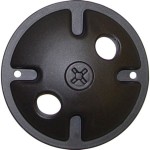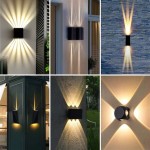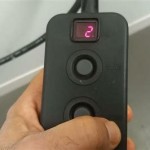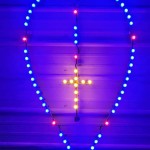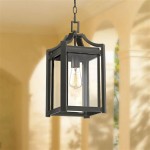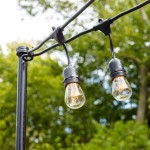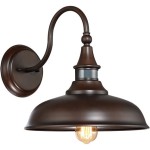Essential Aspects of Most Energy Efficient Outdoor Lights
Outdoor lighting enhances safety, security, and aesthetics for homes and businesses. However, selecting the most energy-efficient options is crucial for environmental sustainability and cost savings. Here are the essential aspects to consider:
Type of Lighting
LED (Light Emitting Diodes): LED lights consume minimal energy and have an exceptionally long lifespan, making them the most efficient choice overall. They produce negligible heat and are available in various colors and brightness levels.
Solar-Powered: Solar-powered lights utilize sunlight to recharge batteries. They are ideal for remote areas or where wiring is impractical. However, they depend on sunlight availability and may not provide consistent illumination during extended periods of darkness.
Compact Fluorescent Lamps (CFLs): CFLs use less energy than traditional incandescent bulbs but more than LEDs. They have a longer lifespan and offer decent light output, but their disposal requires special handling due to the presence of mercury.
Light Output
Consider the desired brightness and beam spread. For security purposes, brighter lights are often preferred. For ambient lighting, dimmer lights with a wider beam spread create a more inviting atmosphere.
Motion Sensors and Dimming
Motion sensors can detect movement and activate lights only when necessary, saving energy. Dimming features allow users to adjust light levels to match the surroundings, further reducing consumption.
Fixture Design
Dark sky compliant fixtures minimize light pollution by directing light downward, preventing it from escaping upwards and interfering with celestial observation or nocturnal wildlife.
Wattage and Lumens
Wattage measures the power consumption, while lumens indicate the amount of light emitted. Higher wattage does not necessarily mean brighter light. Look for fixtures with a high lumen output and low wattage for energy efficiency.
Efficiency Standards
Certified lighting fixtures meet certain energy efficiency standards. Look for ENERGY STAR or equivalent certifications to ensure compliance with industry-recognized energy efficiency criteria.
Other Considerations
Weather Resistance: Outdoor lights should be weather-resistant to withstand rain, snow, and UV rays.
Maintenance: Choose lights with easy-to-access components for effortless maintenance and bulb replacement.
Cost: While initial investment for energy-efficient lights may be higher, their long lifespan and reduced energy consumption typically offset the cost over time.

Energy Efficient Led The Worm That Turned Revitalising Your Outdoor Space

Eco Friendly Outdoor Lighting Ideas

The Top Outdoor Lighting Trends Of 2024

4 Reasons To Upgrade Your Traditional Outdoor Lighting System Led Perspectives

3 Diy Energy Efficient Projects Stacie S Spaces

Low Energy Outdoor Lighting Everything You Need To Know Meteor Electrical Electical

Outdoor And Backyard Lighting We Love Reviews By Wirecutter

4 Benefits Of Using Outdoor Lights For Your Business

Energy Saving Outdoor Lighting Smd Ip65 Aluminium Alloy 200w 300w 450w All In One Led Solar Street Light Alltop
.jpg?strip=all)
Watch The Skinny On Led Lights Or Top 3 Reasons You Should Invest In Leds This Summer Outdoor Lighting Perspectives Of Augu
